At the gas station and grocery store and to those on my mind, I find myself silently sending blessings to people. I find myself speaking blessings aloud to plants and animals that I encounter. Throughout the day, I find myself being a dispatch for administering blessings upon people, places and things and the word beatitude swims into my consciousness from time to time. I even dreamed of this word recently.
Wanna listen to Earth Beatitudes instead of reading?
Beatitude is a beauty-filled word that calls goodness into action. It is a supreme blessing. It is seeing and valuing someone/something for who they truly are and then blessing them. Beatitudes emit an energy that is sincerely needed in our world, and they can be given out by anyone leading with love.
Most people associate beatitudes with the well known Sermon on the Mount, where Jesus gives a series of blessings to the kind and underprivileged sector of the population. 1
“Blessed are the poor in spirit, for theirs is the kingdom of heaven.”
“Blessed are the meek, for they shall inherit the earth.”
“Blessed are they who mourn, for they shall be comforted.”
“Blessed are they that hunger and thirst for justice, for they will be filled.”
etc….
But the concept and the word itself is a living noun, and I wonder why it became frozen in time. All of us are capable of giving and receiving great blessings.
Did you know that the term Beat Generation coined by Alan Ginsburg, Jack Kerouac and others was inspired by beatitude?
Kerouac wrote, “Beat doesn’t mean tired, or bushed, so much as it means beato, the Italian for beatific: to be in a state of beatitude, like Saint Francis, trying to love all life, trying to be utterly sincere with everyone, practicing endurance, kindness, cultivating joy of heart.”
As an offspring of the Beat Generation, I feel it’s my duty to keep sincerity, resiliency and compassion alive with my expansive green heart. I know so many of us feel this way. I put this beatitude attitude into practice by keeping a daily journal of gratitudes, beauty and prayers, jotting down phrases that then call forth a blessed feeling. I practice having faith in these beatitudes. I practice ‘live simply so that others can simply live,’2 which feels like an integral step before blessing anything.
Beatitudes are blessings given from the highest, most clear sighted parts of ourselves. We can offer them to anyone or anything- you do not have to be Jesus. When I think upon the elements and the diversity of life on this planet, some beatitudes arise out of me, and I affectionately call them the Earth Beatitudes.
The Earth Beatitudes
Blessed are the rays of the sun, for they shine upon earth no matter how dark we become.
Blessed are the moon and her phases, for they keep in motion the ocean tides.
Blessed are the waters, for they wash away all that was not meant to last.
Blessed are the winds of air, for they remind us that change is the only constant.
Blessed are the microorganisms of the soil, for they hold the keys to our vitality.
Blessed are the winged ones, for they sing beauty and soar among the skies.
Blessed are the four-leggeds, for they teach us how to play and enjoy this holy ground.
Blessed are the swimming ones, for they know how to freely float and flow.
Blessed are the ones who creep and crawl, for they weave the balance into life’s web.
Blessed are the trees, for they are the pillars of shelter and sustenance.
Blessed are the flowers, for they make heaven here on earth.
Blessed are the fungi, for they compost death to fuel new life.
and Blessed are the earth stewards, for they devote their lives to protecting all of this.
Here’s an invitation for you- with this upcoming holiday of giving thanks, take time to weave the gratitude into a beatitude, for as the modern day Blessing Saint John O’Donohue says, “The more we recognize our found blessings, the more they increase around us.”
Mary Morgaine Squire
11/23/24
Under a waning moon
~Love Letters from our Plant Allies~
Plantain
Plantago spp.
Plantaginaceae
Listen to Mary Plantwalker read a Love Letter from Plantain
Dear People,
It is easy to overlook me, as I am a simple plant. You might be standing right on top of me while talking about what ails you and how you don’t know where to find relief. I will humbly sit there, waiting for you to look down and notice me. To remember me. For I have been in relationship with you for eons and all the healing knowledge of plants is still in the memory of your DNA, even if you have forgotten in this lifetime. I am one of the gateway herbs and once you have experienced my healing properties, your excitement about other weedy cosmopolitan plant powers will be reawakened and sparked! Plantago is my botanical name, with the root ‘planta’ meaning ‘broad and spreading,’ which by the way is also the same root for the word ‘plant!’ I am the plant that defines a plant, and I take pride in that! Planta also means ‘sole of the foot’ and ironically indigenous peoples of North America named my most ubiquitous Eurasian species, Plantago major, ‘White Man’s Foot.’ The ‘ago’ part of my name just means ‘sort of.’
Knowing my genus Plantago helps clarify when talking about me, as there are many others with the common name of Plantain. Robin’s Plantain (Erigeron pulchellus) of the Aster Family, the orchid Rattlesnake Plantain (Goodyera oblongifolia) and Tropical Plantain (Musa spp.,) famous in Latino cuisine, are some of the other plants who share my name. The edible fruit Plantain is the one I am most often confused with, so remember to differentiate me by using my botanical name, ok?
I have parallel, rib-like veins that run up and down all of my leaves and that is why I have another common name- Ribwort. These veins can cause me to be mistaken for a monocot, which I am not. I have over 200 species in my genus and have evolved worldwide, but the three most famous of my children are Plantago lanceolata, major and psyllium.
The lanceolatas, as their name bespeaks, have narrow, lance-like leaves, while the majors, also known as Common Plantain, have broad leaves that form dense rosettes and have majorly spread. This hearty species has been written about by your poet Henry Wadsworth Longfellow, in ‘Hiawatha’
Whereso’er they tread, beneath them
Springs a flower unknown among us;
Springs the White Man’s Foot in blossom.
Plantago major seed came over to North America with the colonizers and spread as rapidly as the white man did, displacing some of the continent’s native species rugelii, aka Blackseed, that looks so very similar to major but has a red to purplish petiole base. The psylliums and ovatas species produce an abundance of easy to harvest seed heads that you then turn into fiber supplement products. All my parts are fibrous, actually. My entire plant body is medicinal.
I live in meadows and what you call ‘waste places.’ I prefer alkaline, moist soil but can grow straight out of gravel or compacted dirt. Find my perennial plant in the yard, garden and woodland edges. I even have a seashore child, Plantago macrocarpa. Your children see me and are drawn to my long, strong stems and weave them into crowns, bracelets and necklaces. I give my seeds as food for birds and small mammals. I love to be needed!
Your species also like to eat my young tender leaves and seeds. Put me in salads before I become too tough and stringy. I have not a strong scent nor taste, am pleasant to ingest and am food as medicine. I was a regular leaf vegetable for your prehistoric ancestors. I make a nice tea with an earthy flavor and a sweet aftertaste.
Another one of your famous poets, William Shakespeare, alludes to me and my capacity to cure, in the play ‘Romeo and Juliet’
Benvolio: Take thou some new infection to the eye,
And the rank poison of the old will die.
Romeo:
Your plantain leaf is excellent for that.
Benvolio: For what, I pray thee?
Romeo:
Your broken shin.
To pull out poison and to mend, that’s two properties I naturally lend. Chew my fresh leaf and apply to any ailing condition of the skin: boils, cuts, rashes, stings, bites, blisters and ulcers to name a few. I am a vulnerary--nature’s band aide, a first-aid remedy at the ready; I beg you to teach your children this! I can bring instant relief to the tears of a little one’s pain when stung by a bee. Try me out on hemorrhoids or herpes and see for yourself how I will heal.
I am a famous snakebite remedy, an antidote for poison, as I localize the poison and keep it from further spreading into your bloodstream. I work like this on tetanus, too.
You may be most familiar with me as a salve, rubbed on burns, bruises and cuts. Poultice or juice my whole leaf for swellings, inflammation and pain relief. I have a miraculous ability to draw out irritants like splinters, glass or metal that enter with injury. I also pull out pus to cease the spread of infection and my allantoin both soothes and repairs the wounded tissue. I am a wound healer for the wounded healer.
There are testimonies of me restoring hearing loss by placing my leaf juice in the ear. I can relieve an earache this way. I can cure intermittent fevers, bleeding gums, dropsy, excess discharge and lower cholesterol levels. The Hopi Tribe uses my Woolly Plantain species to make a person more agreeable, how about that?! But listen- none of my gifts work if you don’t engage with me. I need to be embraced.
I remember when the first Homo sapiens figured out that my entire plant, especially my root, is superior for respiratory issues. I am not as readily called upon today but my strength is still there to bring up phlegm or heal pneumonia. I am a regulator of the lungs, so I also serve those with a consistent, unproductive, hacking cough—those who are always clearing their throat—by lubricating and rebuilding tissues. Call on me if you have asthma or any pulmonary disease.
Navajo make a cold infusion of my whole plant to reduce appetite. My seed makes a mild laxative and is a healthy choice for regulating bowel movements. I can stop diarrhea or ease constipation. I increase peristalsis, calling the bowels back into balance. My psyllium species yields the most fiber and mucilage for this but really all of my seeds contain this property. If taking my seeds for this effect, do drink plenty of water as once I absorb the toxins in the large intestines, I need you to be fully hydrated to be able to pass them on through.
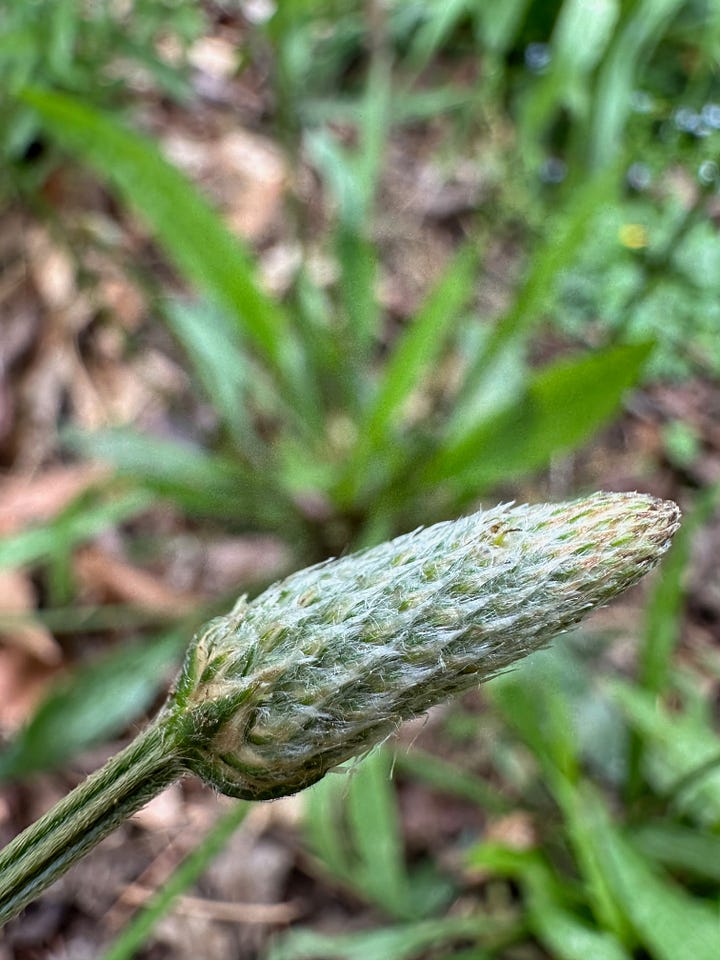
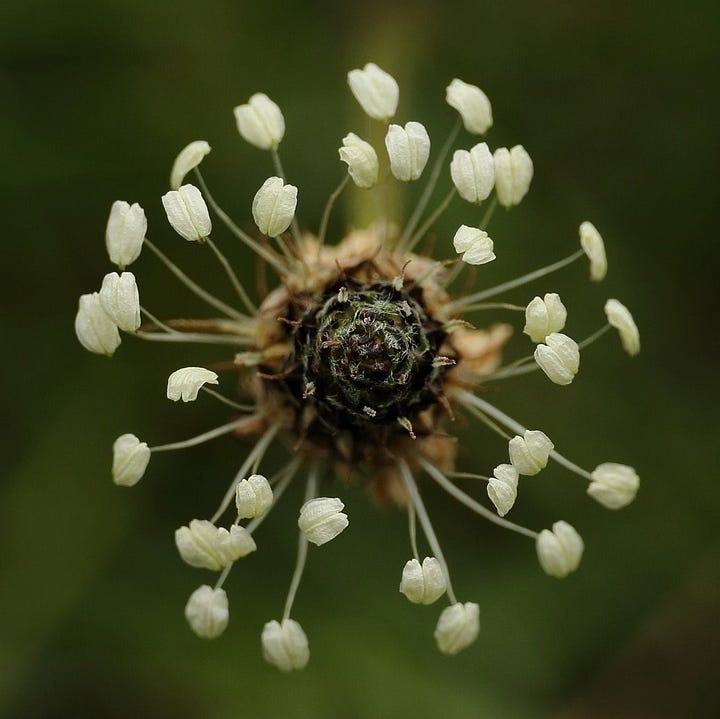
I do simple work on the elimination parts of your precious body by coaxing out the unneeded materials lodged in your skin, lungs or bowels. Let me know what you no longer need and I will get busy removing it. I do the same thing energetically, too. My flower essence can help you remove obstacles in your field and lay down your burdens. My name contains the word Plain and maybe that’s just coincidence with how commonplace and simple I appear to be. But beware or you will miss this truth —it is in the most simple, commonplace things where good health abounds.
Love,
Plantago
Weaving Community~
~Beth Berry of Revolution From Home is reopening her 1:1 coaching practice to support those who are already devoted to a life of growth, healing, and radical authenticity. I did coaching with her in 2020 and found it extremely centering and helpful!
~Hurricane Helene’s affects are still with us. That seems obvious, but to the fast-paced headlines, people forget that a catastrophe takes years, sometimes lifetimes, to heal. I just received a copy of
’s zine, author of Spirit Dirt on Substack, ‘Helene in Appalachia’ and am excited to read what she journaled about during the aftermath. She lives in Celo, NC, a small town that was drastically damaged by the storm yet got very little attention. You can order this journal here.~Appreciating these words of praise for the inspiring John O’Donohue
Thank you for reading Earth Devotions & bless your life.
Matthew 5:3-12
Mahatma Gandhi

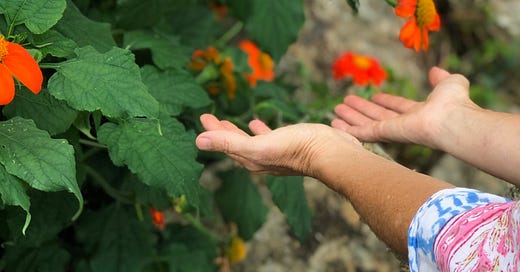



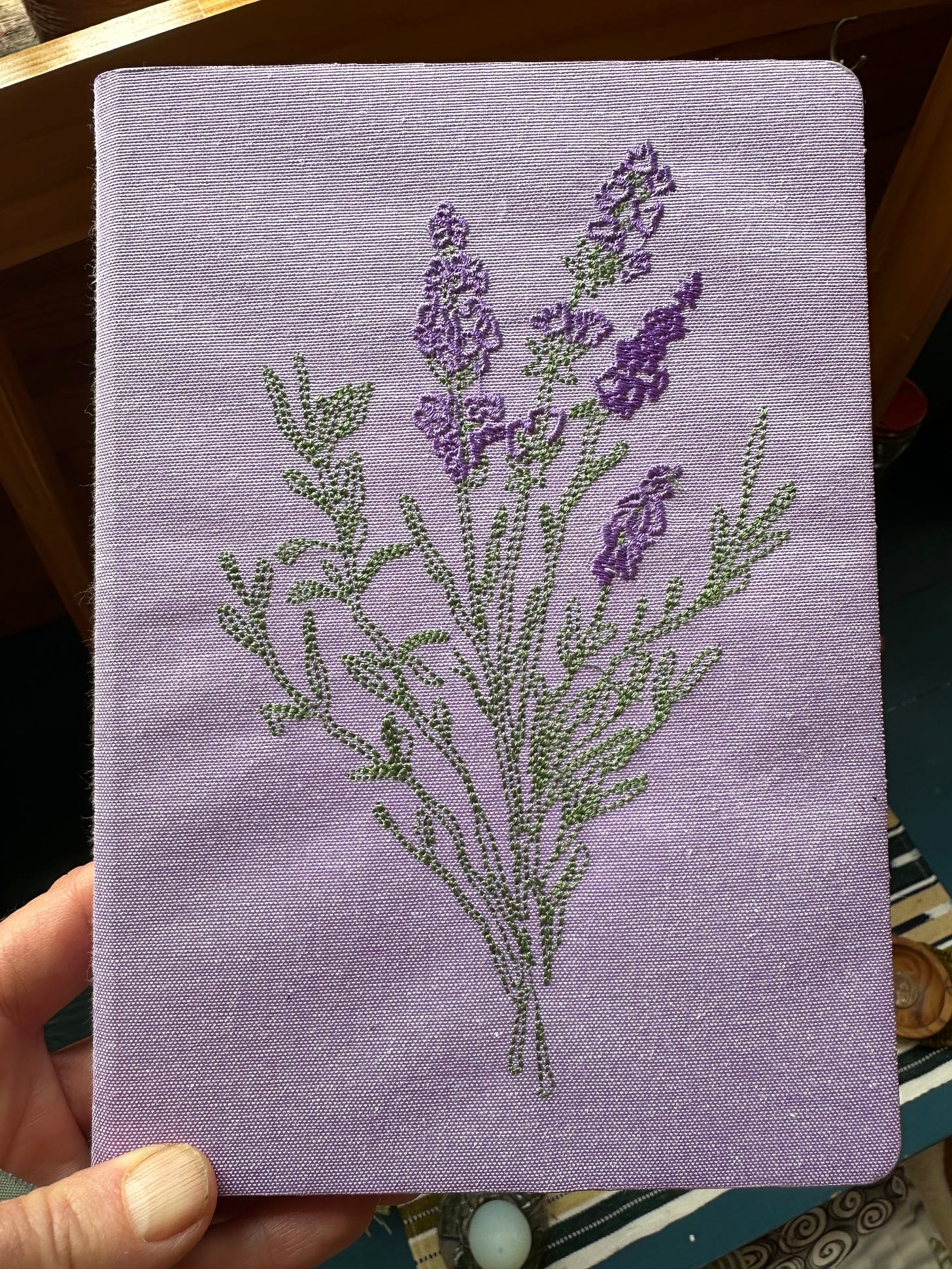
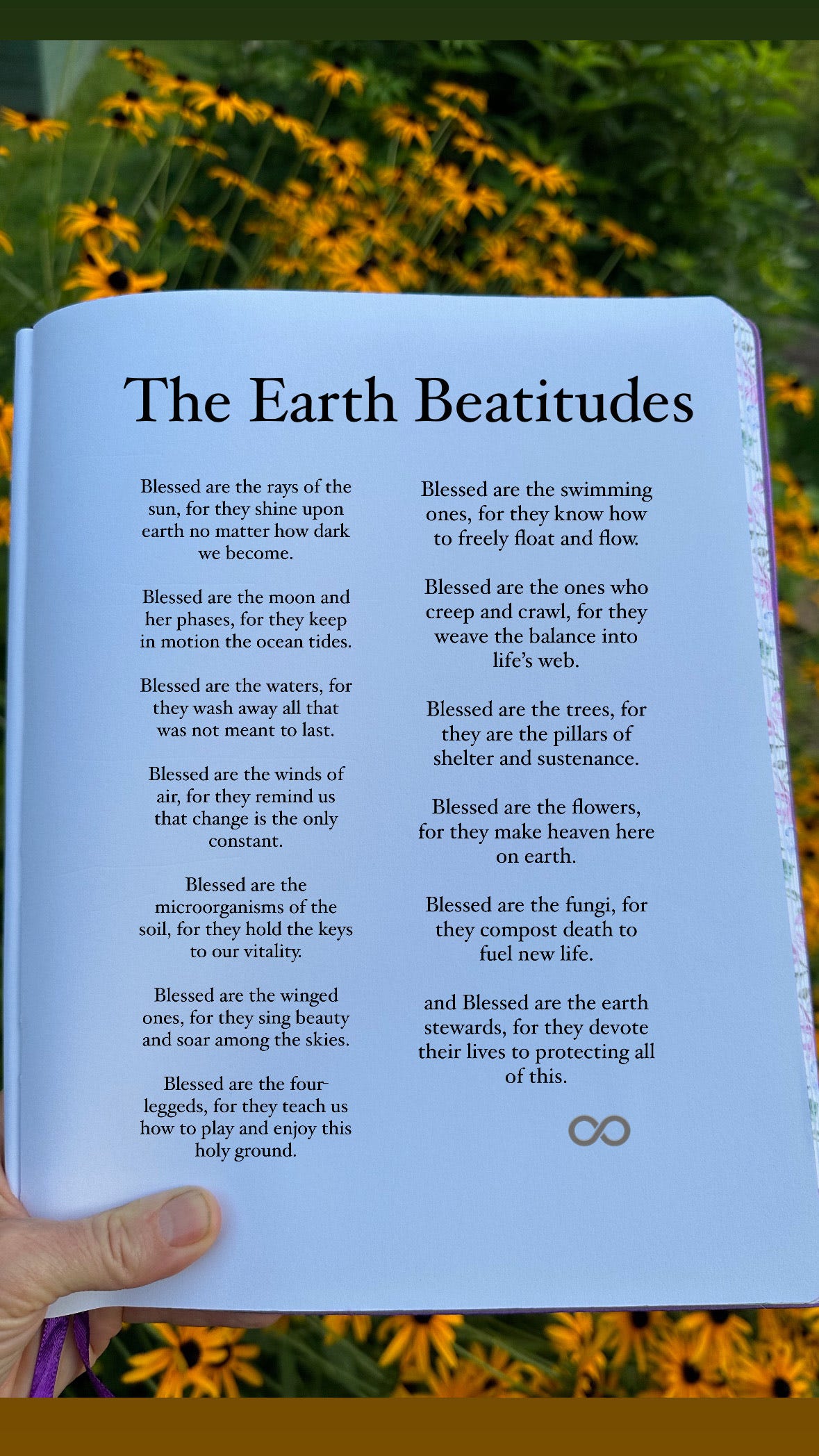
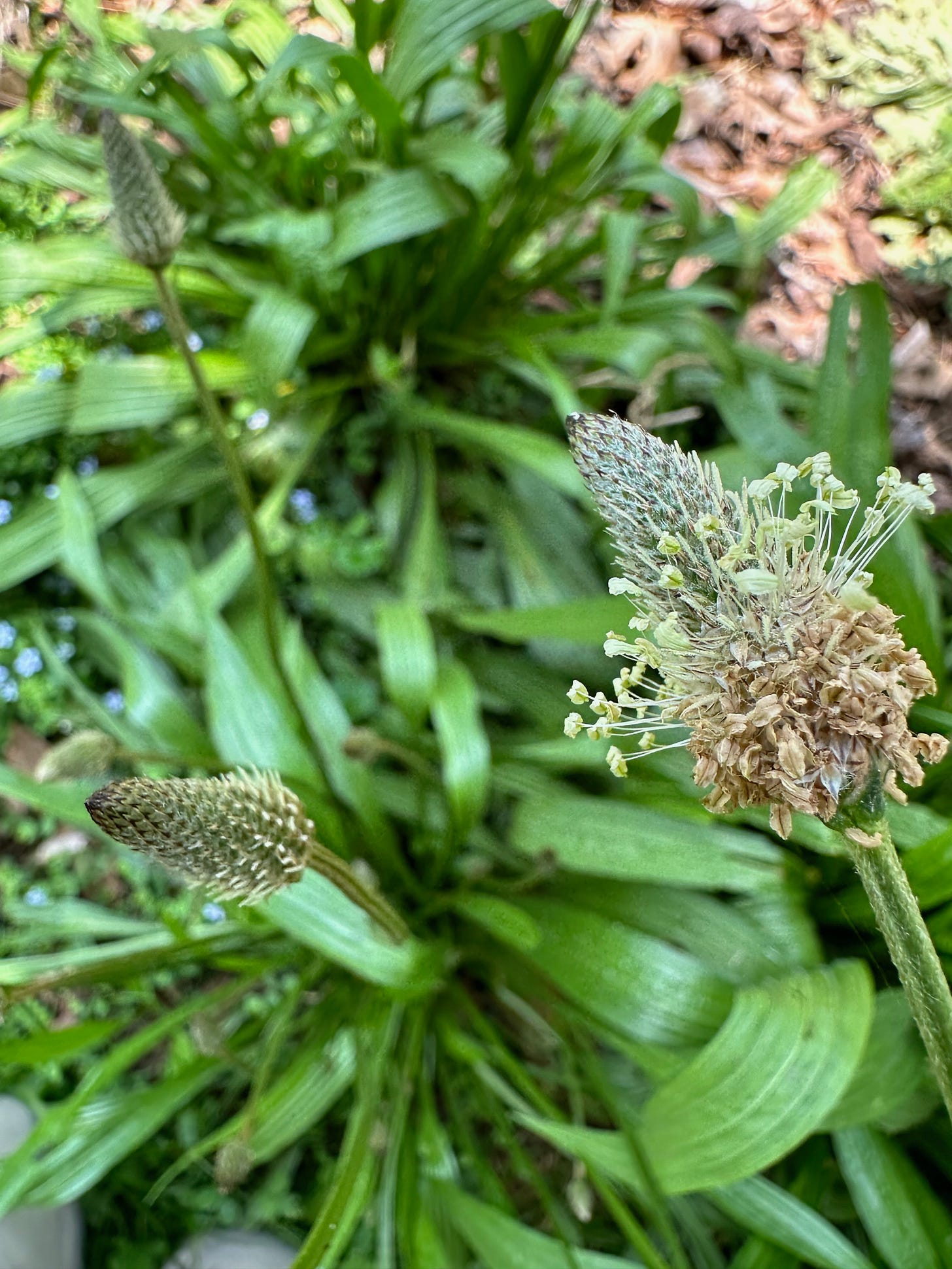
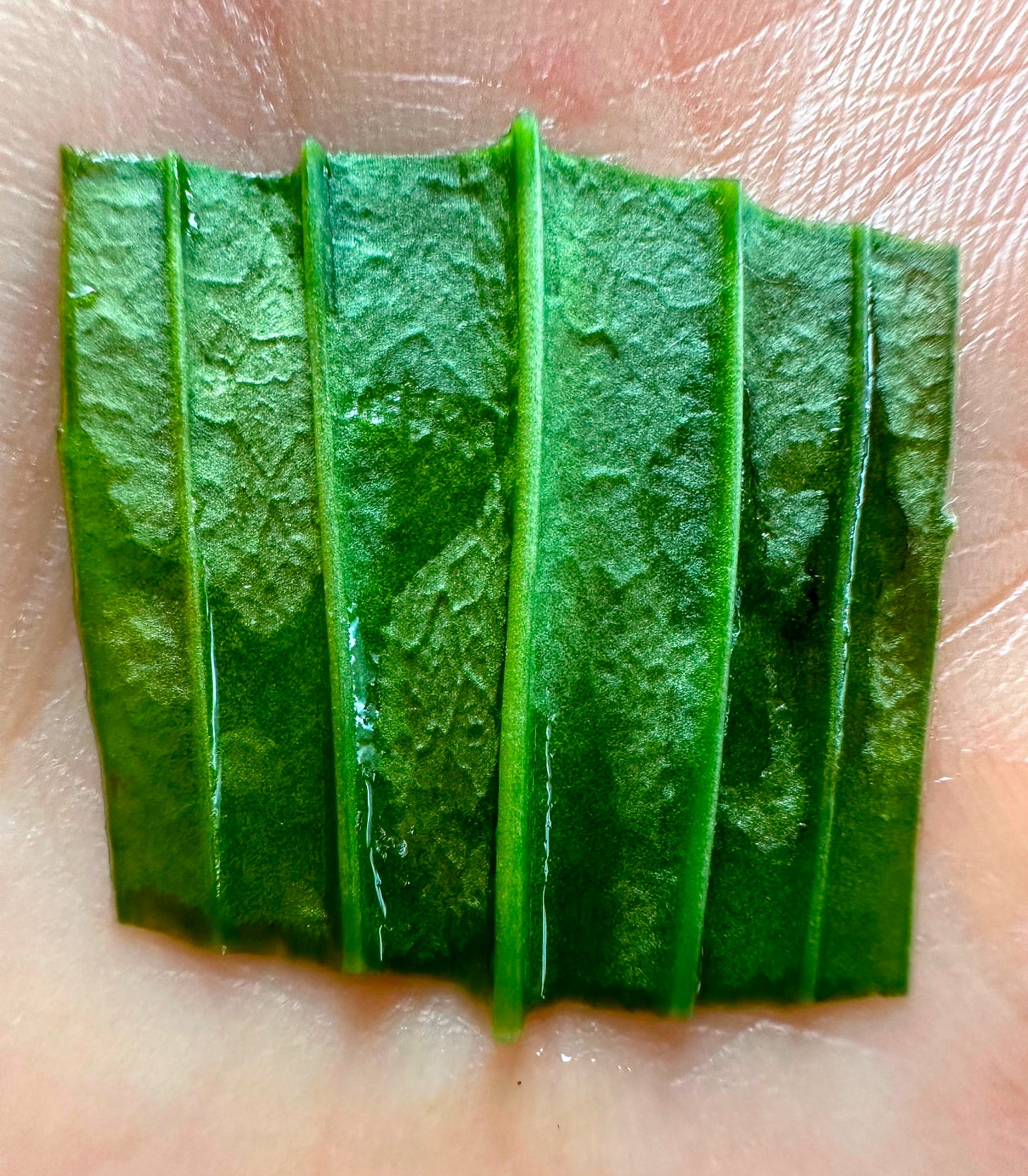
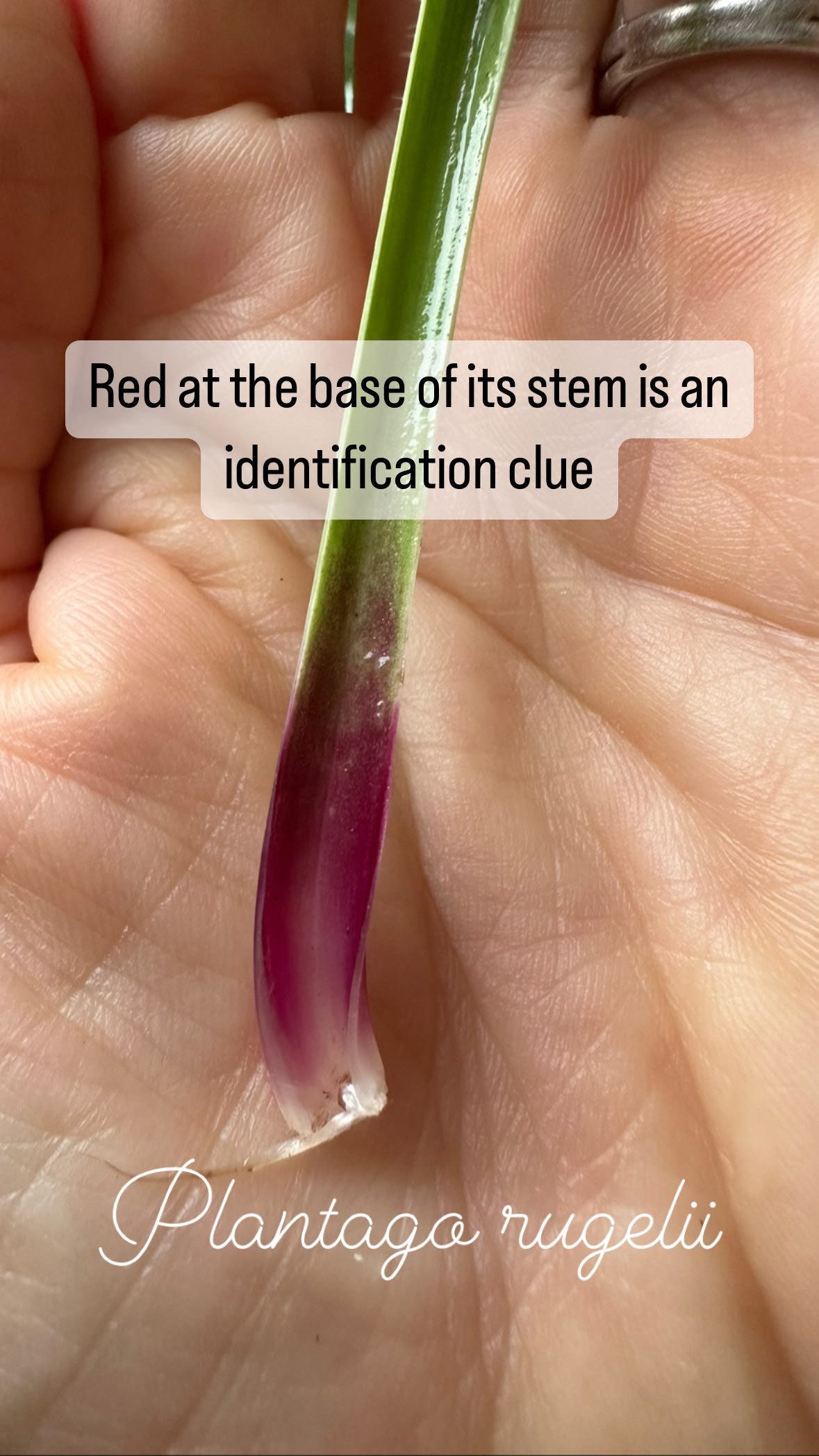
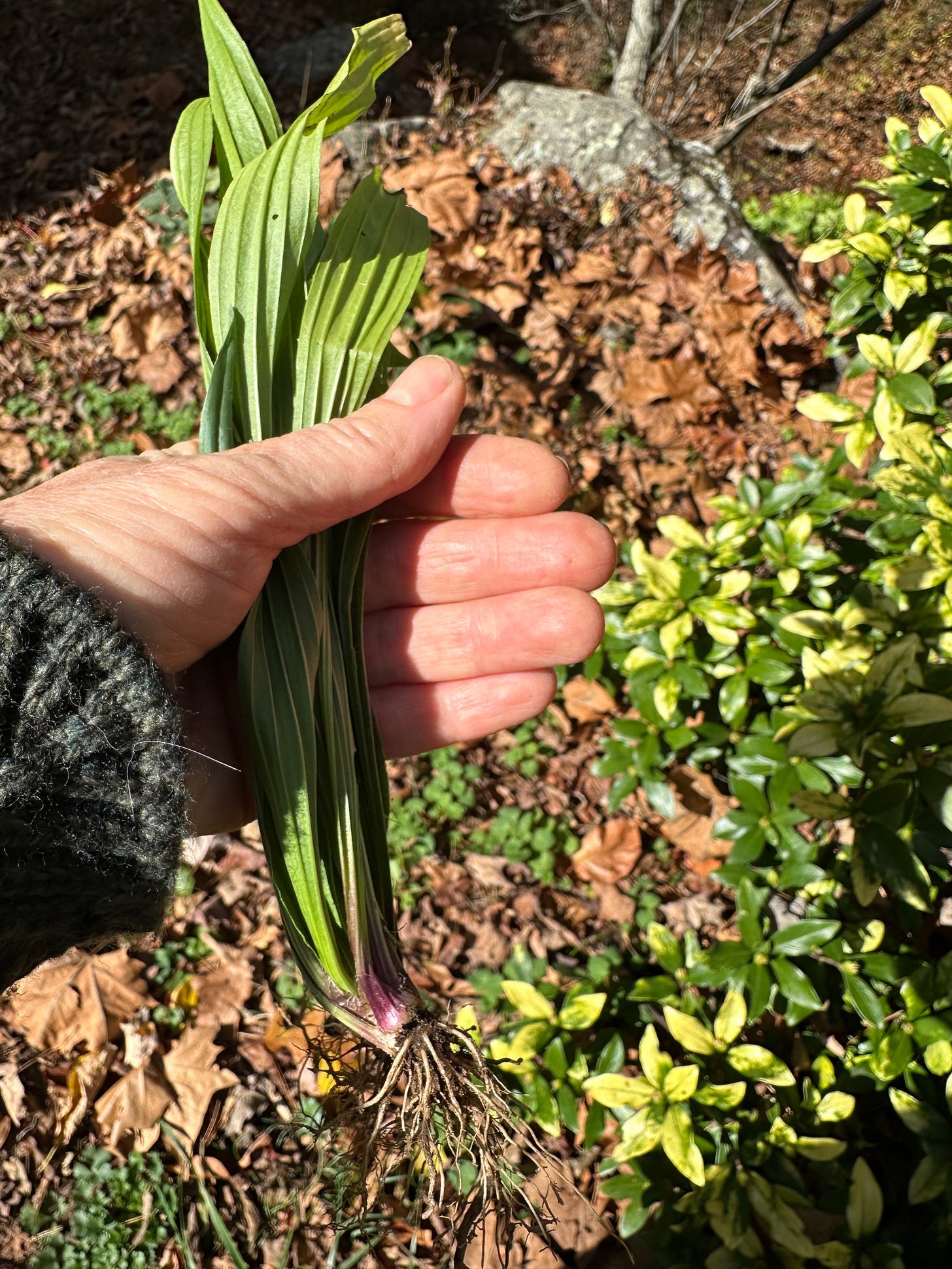

Thank you!!! Have a blessed holiday.
This is so beautiful….may I share (with credit) your Earth Beatitudes 🌿💚